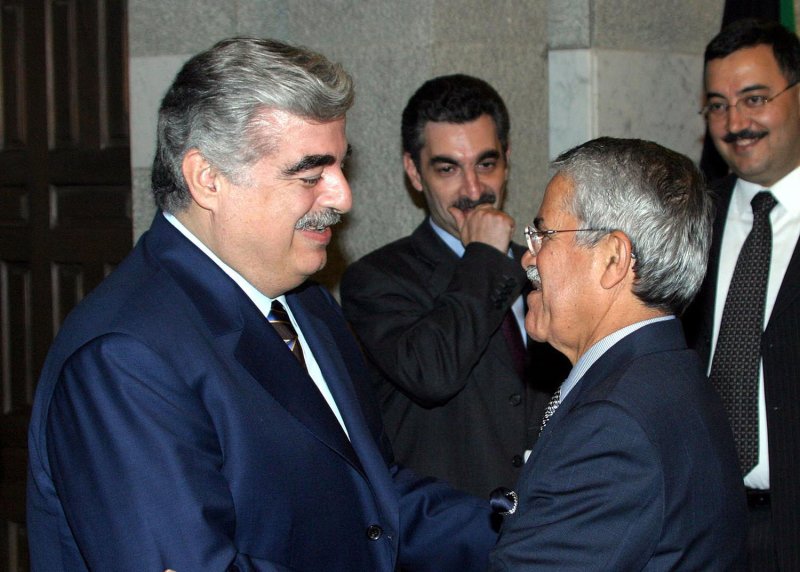Then Lebanese Prime Minister Rafik Hariri (L) welcomes Saudi oil minister Ali al-Nuaimi at a dinner Wednesday, June 2, 2004, on the eve of an extraordinary OPEC meeting in Beirut to discuss soaring oil prices and the possibility of increasing oil production. Hariri was assassinated in Beirut on Feb. 14, 2005. (UPI Photo/Maumoud el-Tawil) |
License Photo
BEIRUT, Lebanon, Jan. 16 (UPI) -- The trial of four Hezbollah members indicted in the 2005 assassination of Lebanon's Rafik Hariri began in The Hague amid fears of rising sectarian tensions.
Optimists say a verdict could come by spring 2015. But the trial could last for years and become a potential political time bomb in the Middle East's widening sectarian conflict, deepening feud between Lebanon's Sunni and Shiite Muslim communities.
The trial in The Hague, Netherlands, is expected to put Hezbollah under international scrutiny at a time when it is involved in the 34-month-old civil war in neighboring Syria and, for the first time, under increasing attack by jihadist rivals at home.
There's speculation Hezbollah leader Hassan Nasrallah could be indicted in Hariri's death.
The Shiite movement's credo that it constitutes Lebanon's "resistance" to Israel has been badly shredded by its willingness to turn its guns on other Muslims to protect its own interests and those of its patron, Iran.
Evidence amassed by the prosecution team of the Special Tribunal for Lebanon, set up by the U.N. Security Council to investigate the Hariri assassination, indicates this killing of fellow Arabs arguably began at 12:56 p.m. on Feb. 14, 2005.
That was when Hariri's motorcade of six armored Mercedes limousines was blown apart on Beirut's seafront cornice when a suicide bomber driving a Mitsubishi truck detonated what U.N. investigators say was the equivalent of 2 1/2 tons of explosives.
Hariri, a billionaire business tycoon who served five terms as Lebanese prime minister, and 22 others were killed in the massive blast, with 226 wounded.
The assassination, and killings that followed, cemented the rift between Lebanon's Sunnis and the pro-Syrian Shiites which has worsened over the years.
Hezbollah is under pressure because of its involvement in Syria to save the dictatorship of President Bashar Assad and his minority Alawite sect, an offshoot of Shia Islam, from overwhelmingly Sunni opponents.
Analysts say the decision to aid Assad almost certainly was made in Tehran rather than at Hezbollah's heavily guarded command center in the Shiite stronghold of south Beirut.
The speculation is Nasrallah, who built the Shiite movement into the fearsome fighting machine it became through fighting Israel since 1982, was reluctant to get involved in the Syrian conflict. But he had little choice since Damascus is Hezbollah's strategic link to Iran and a conduit for arms and funds that have made the Hezbollah movement the most powerful military force in Lebanon.
Hezbollah denies involvement in the assassination of Hariri, once the leader of Lebanon's Sunnis who have traditionally been protected by Saudi Arabia, Shiite Iran's main rival in the Middle East.
U.N. investigators initially suspected Syria, which had controlled Lebanon since 1976, and its proxies in Lebanon's intelligence services, were behind the Hariri assassination.
Hariri was increasingly pushing for Syria to quit Lebanon, a most unlikely prospect given Damascus' reliance on the tiny mercantile nation to keep its own creaky economy running and its plundering generals quiet.
Syria strenuously denied involvement in Lebanon's St. Valentine's Day massacre. But the suspicions grew as a dozen other leading anti-Syrian figures were systematically assassinated.
Those suspicions remain, based on the premise that Hezbollah would never have dared eliminate such a prominent figure as Hariri without the approval of Damascus -- and probably Tehran as well.
The four Hezbollah suspects are accused of helping carry out the assassination, but the masterminds have not been identified, and may never be.
Dozens of political figures have been assassinated in Lebanon since 1975 and no one has ever been arrested, let alone convicted. Few people expect that to change now even though the tribunal is the first international legal body formed specifically to investigate the assassination.
The suspects are being tried in absentia. Their whereabouts are unknown, but at least two are believed to be in Iran.
Nasrallah insists Israel killed Hariri and has branded the tribunal a U.S.-Israeli conspiracy. He refuses to hand over the suspects to the tribunal or to Lebanese authorities, "not in 30 days and not in 30 years."
He's threatened to "chop off the hand" of anyone who tries.





